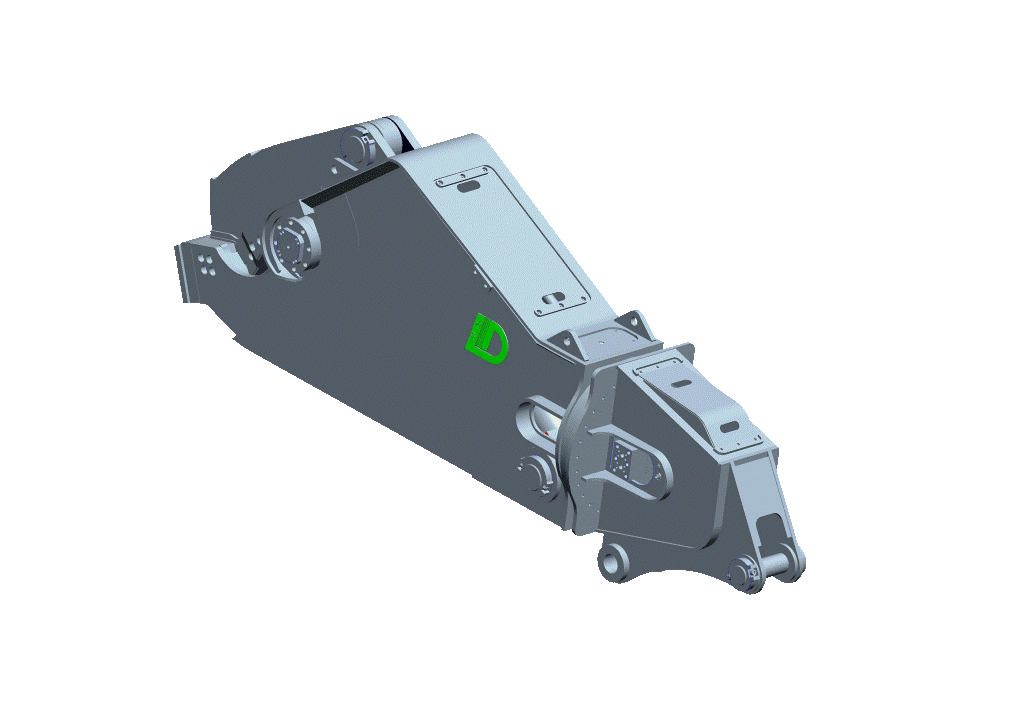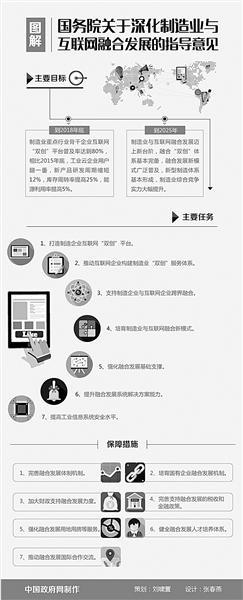China will not be absent
Release time:
2016-06-17
China Science and Technology Network 2016-06-1702:14
Manufacturing: the future main battlefield of "Internet plus"
——Interpreting the Guiding Opinions on Deepening the Integration and Development of Manufacturing Industry and the Internet
Wen · Our reporter Liu Xiaoying


With the rapid development of the "Internet plus" industry, all industries want to add together with the Internet to promote new industrial vitality. All walks of life have gradually realized that "Internet plus" can cover the whole society and all fields, and promote the transformation and progress of all walks of life. The Guiding Opinions on Deepening the Integrated Development of Manufacturing and the Internet (hereinafter referred to as the Opinions) issued by the State Council recently pointed out that manufacturing is the main battlefield of "Internet plus".
Jiang Mingwei, the chief expert of Beijing Institute of Mechanical Industry Automation, evaluated the "Opinions" as a guiding document for the transformation and upgrading of the manufacturing industry, the development of intelligent manufacturing, and the pursuit of a strong manufacturing country.
This will be an important policy document that has a profound impact on China's economic development and overall national strength. China is a major manufacturing country in the world and also a major internet country. The integration of the two has both unique basic advantages and broad potential for value, "said Fan Huiwen, Vice President of the China Institute of Electronic Information Industry Development.
Our Internet Needs Self Evolution
After 22 years of development, China's internet has made tremendous progress and is currently a major internet economy. Since 2013, China's consumer e-commerce transaction volume has surpassed that of the United States, ranking first in the world. "said Gao Xinmin, Vice Chairman of the China Internet Association.
He told reporters that many international organizations and well-known research institutions have ranked China among the top three in the global internet economy based on this. However, Gao Xinmin also admitted that currently, from an application perspective, the internet is still a consumer oriented internet that primarily serves individuals, while the production oriented internet that primarily serves enterprises has made efforts but has not achieved much. Especially in the manufacturing industry, the application innovation is not significant, traditional industries have not benefited much, and no large internet companies have emerged.
From the perspective of the development level of e-commerce alone, China's online retail, also known as consumer e-commerce, has achieved remarkable results, ranking among the top in terms of scale and service level globally. However, in terms of enterprise e-commerce, we have a significant gap internationally. "Gao Xinmin admitted, Due to the late start and poor foundation of enterprise informatization in China, the internet has not achieved significant success in the manufacturing process of value creation, and the pace of application for internet enterprises urgently needs to be accelerated
Gao Xinmin also believes that the Internet itself is developing. Due to the development of IoT technology, the miniaturization, low power consumption, and low cost of sensing devices, the high-speed, high reliability, and trustworthiness of wireless networks, as well as the continuous improvement of technologies such as big data analysis and network digital object identification analysis. The Internet is transitioning from the Internet of People to the Internet of People and Everything, from a consumer oriented Internet that primarily serves individuals to a productive Internet that also serves enterprises, Realizing these two transformations will fully tap into the potential of the new generation of internet technology and commercial value, leverage the advantages of internet agglomeration to optimize various production factor resources, and build a new production organization system and development model. The role of the internet economy in the modernization of the national economy will be more extensive and profound. The international competition in this field has now begun, and the integration and development of manufacturing and the internet are mutually beneficial The strategic position and direction of the development of the networked new economy
Made in China "stands at a fork in history
From the perspective of manufacturing, China is a major manufacturing country that has formed a complete manufacturing industry system with comparative advantages, supporting the rapid growth of China's national economy, significant enhancement of national defense strength, and significant improvement of international status. However, Gao Xinmin also stated that in the past decade, there have been significant changes in domestic and international market demand, and technological revolution has triggered industrial transformation, reshaping a new global economic landscape. Internationally, even countries that have completed their industrialization process still propose "re industrialization" and advanced manufacturing development strategies on the basis of existing industrial powers. Some industrialized countries have clearly stated their intention to address China's challenges. In China, both the downward pressure on the economy and the formation of a new economic normal require accelerating structural reforms, especially supply side structural reforms. The manufacturing industry bears the heavy responsibility of reducing production capacity, adjusting structure, and stabilizing growth. Upgrading the quality and efficiency of "Made in China" has become a very urgent task. The integrated development of manufacturing and the internet is an important path to deepen supply side structural reform and a major measure to accelerate the upgrading of "Made in China" in terms of quality and efficiency.
"Internet plus" is the "engine" of the next generation manufacturing industry
The application of information technology, represented by the Internet, in the manufacturing industry has created countless intelligent equipment and products, opened up new markets and created immeasurable new demands. The integration, innovation, and mutual promotion of the Internet and manufacturing industry have provided a specific and feasible technological path for the transformation and upgrading of China's manufacturing industry, and also opened up an immeasurable application market for the development of the Internet industry, "said Fan Huiwen.
Although fully aware of the importance of this addition, how to achieve the integration of the two has become the most urgent issue that follows. Gao Xinmin believes that promoting the integration of manufacturing and the internet is not only a requirement for improving the quality and efficiency of "Made in China", but also a necessary path for the internet economy to have a broader and more profound impact on the national economy.
Essentially, it is to leverage the driving role of the Internet in manufacturing innovation, shifting the manufacturing industry to new infrastructure represented by the Internet, and achieving the third leap in the industrial system from mechanization, electrification, and automation to informatization, "said Gao Xinmin.
The Opinion emphasizes that the integration of manufacturing and the Internet is conducive to the formation of superposition effects, aggregation effects, and multiplication effects. It not only accelerates the transformation of new and old industrial systems, but also cultivates new models and formats of the Internet, continuing the glorious chapter of China's Internet economy.
In this regard, Gao Xinmin said: "The main body of the integration of manufacturing industry and the Internet is enterprises, including manufacturing enterprises and Internet enterprises. At present, the former is particularly important. We should focus on stimulating the innovation vitality and transformation power of existing manufacturing enterprises, especially for the decision-makers of traditional enterprises. We should improve the awareness of" Internet plus "and implement the guiding policies."
At the same time, we should encourage manufacturing enterprises and internet enterprises to engage in various forms of cooperation, integrate development, and cultivate a new ecosystem of industrial development through innovative development ideas, models, and formats. We should also cultivate new networked production and consumption models such as intelligent factories, network collaborative manufacturing, personalized customization, service-oriented manufacturing, and shared economy, "said Gao Xinmin.
Deepening the integration and development of manufacturing and the Internet is a fundamental measure to effectively promote the reform of the supply side structure, "said Fan Huiwen.
This time, China cannot be absent
In the era of industrial and economic globalization, the division of labor in modern industrial systems is becoming increasingly detailed, and complex products are designed and produced by several suppliers in collaboration. The 132500 components of the Boeing 787 aircraft are produced by over 70 countries and thousands of suppliers. Jiang Mingwei said, "This requires relying on the internet to establish global supply chain collaborative production and design
If due to historical reasons, we missed the previous few industrial revolutions, which resulted in the Chinese nation falling behind for a hundred years, then this new industrial revolution provides an excellent strategic opportunity for the rise of the Chinese nation, "Fan Huiwen said.
Fan Huiwen also pointed out that the manufacturing industry is the foundation of establishing a country, the tool for revitalizing the country, and the foundation for strengthening the country. It is also a strategic fulcrum for maintaining stable growth and adjusting the structure at present. After decades of hard work, China's manufacturing industry has steadily ranked first in the world. But he also emphasized that although our manufacturing industry is large, it is not strong, and the problem of weak foundation remains prominent, while facing fierce competition from the New Industrial Revolution.
At a critical period when the global internet is expanding from the consumer sector to the production sector, developed countries have proposed new strategies such as Industry 4.0, Industrial Internet, and Intelligent Manufacturing to promote the integration and development of the internet and manufacturing industry. With manufacturing as the key link, manufacturing as the main battlefield, and manufacturing enterprises as the main force, they are seizing the competitive high ground of the new round of industrial revolution development concept, architecture standards, core technology, and ecosystem. Fan Huiwen stated that in such a situation, China must leverage the dual advantages of active innovation in internet applications, leading industrial scale, gathering talent capital, and a complete, independent, and large-scale manufacturing industry, forming a superposition effect, multiplication effect, and aggregation effect. While fully leveraging economies of scale, China must develop personalized manufacturing and personalized services, strengthen fine management and business model innovation, comprehensively Continuously enhancing the international competitiveness of China's manufacturing industry.
The Opinion points out the path for the integration and innovation of manufacturing and the Internet, builds a foundation, provides policy guarantees, and has important strategic and practical guiding significance for the transformation and upgrading of the manufacturing industry, the development of intelligent manufacturing, and moving towards a manufacturing powerhouse.
Related Cases



 No. 42050202000596
No. 42050202000596
